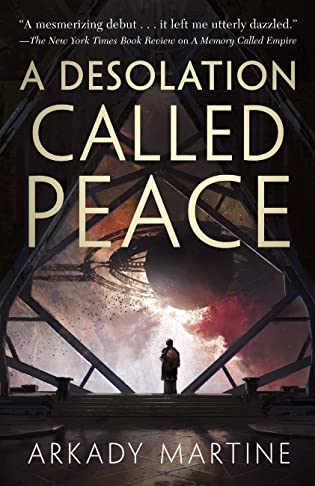 A Desolation Called Peace (Teixcalaan, #2)
A Desolation Called Peace (Teixcalaan, #2) by
Arkady Martine Format: audiobook,
eARC Source: purchased from Audible,
supplied by publisher via Edelweiss,
supplied by publisher via NetGalley Formats available: hardcover, paperback, ebook, audiobook
Genres: science fiction,
space opera Series: Teixcalaan #2 Pages: 496
Published by Tor Books on March 2, 2021
Purchasing Info: Author's Website,
Publisher's Website,
Amazon,
Barnes & Noble,
Kobo,
Bookshop.org Goodreads An alien armada lurks on the edges of Teixcalaanli space. No one can communicate with it, no one can destroy it, and Fleet Captain Nine Hibiscus is running out of options.
In a desperate attempt at diplomacy with the mysterious invaders, the fleet captain has sent for a diplomatic envoy. Now Mahit Dzmare and Three Seagrass - still reeling from the recent upheaval in the Empire - face the impossible task of trying to communicate with a hostile entity.
Their failure will guarantee millions of deaths in an endless war. Their success might prevent Teixcalaan’s destruction - and allow the empire to continue its rapacious expansion.
Or it might create something far stranger....
My Review
I mostly listened to A Desolation Called Peace, and because I don’t have quite as much listening time as I did pre-COVID, it took about three weeks before I got impatient and started finishing chapters in the ebook and then just losing all patience completely and switching to the ebook because I just had to find out what happened.
This matters because the length of the total listen divided by the amount of time I listened each day compared to the amount of time post-listening each day, when combined with the sheer denseness of the story and the worldbuilding meant that I had a lot of time to think about the story in between listening to the story.
And I had a LOT of thoughts. Maybe not enough to fill the entirety of Teixcalaan, but more than enough to fill Lsel Station. And so we begin.
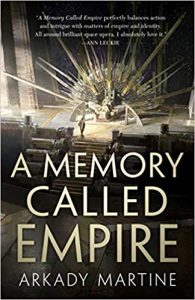 We begin not terribly long after Mahit Dzmare returned to her home, tiny, independent(ish) Lsel Station, after the tumultuous events of A Memory Called Empire. And everything that happens in A Desolation Called Peace is a result of those events.
We begin not terribly long after Mahit Dzmare returned to her home, tiny, independent(ish) Lsel Station, after the tumultuous events of A Memory Called Empire. And everything that happens in A Desolation Called Peace is a result of those events.
Meaning don’t start here. Start with A Memory Called Empire, which won the Hugo Award for Best Novel in 2020 because it was so incredibly awesome. It’s even more of an achievement when you realize that Memory was the author’s debut novel. WOW! Whatever you’ve heard about just how good it was doesn’t even come close.
For Mahit, the results of that eventful, impactful week – and it all took place in just a week – have left her back home in a state that Mahit refers to as “fuckedness” with damn good reason. She’s screwed no matter which way she turns.
The powers-that-be on her station didn’t expect her to come back home. Now they all want to use her as a wedge against the rapaciousness of Teixcalaan. Except for the Councilor for Culture, who just wants to slice her up to see what makes Dzmare and her imago, the machine that holds the memories she carries of her late predecessor Yskandr Aghavn, work. Because they weren’t supposed to.
Mahit knows full well that she won’t survive the slicing. She wasn’t meant to survive Culture’s previous efforts to sabotage her but those were at a bit of a remove. If she is unable to outmaneuver her enemy she’ll be directly under the Councilor’s knife. Literally, and certainly fatally.
And that’s where the war that Mahit traded her station’s freedom for at the end of the previous story reaches out and physically grabs Mahit out of Lsel Station in the person of Three Seagrass, her former cultural attache – and potential lover – during Mahit’s hell week on Teixcalaan.
Three Seagrass, now the Third Undersecretary in the Ministry of Information, has sent herself as a special envoy to the Teixcalaan fleet prosecuting that war. The Fleet needs a diplomat and a translator. Three Seagrass needs to get out of her office before she molders there. She needs an adventure and a challenge. Most of all, she needs Mahit Dzmare, even if she can’t quite admit it to herself.
Out of the frying pan and very much into the fire, Three Seagrass sweeps into Lsel Station, whisks Mahit away from the imminent threat of the Culture Ministry’s surgical suite, and takes her to the flagship of the Teixcalaan fleet to help her translate the speech of the enemy, an enemy who doesn’t so much speak as make mechanical sounds that seem to be designed to make humans, whether Teixcalaanlitzlim like Three Seagrass or barbarians like Mahit Dzmare, involuntarily perform the technicolor yawn past the point where they have any cookies, or anything else, left to toss.
When the aliens aren’t making all the humans ride the “vomit comet”, their ships are regurgitating acidic spit that eats its way through both Teixcalaanli ships and pilots. It’s up to Three Seagrass and Mahit to get the aliens talking instead of shooting – or spitting – before it’s too late.
All the while, political forces within the Fleet are attempting an end run around both the Fleet’s commander- and the Emperor.
No pressure – well, at least no more pressure than last time. The bloody results of which no one is likely to forget.
Escape Rating A: A Desolation Called Peace is an absolutely excellent example of science fiction as the romance of political agency. Not that plenty of Earth-shaking, or perhaps that should be Teixcalaan-shaking, events don’t happen, and not that Mahit and Three Seagrass aren’t using every scrap of agency they have so that they, the fleet and the empire – and Lsel Station – all survive more or less intact. But all of pretty much everyone’s actions in this story have their roots in the convoluted politics of the empire, both from within and from without.
As much as I fell into A Desolation Called Peace and could not stop thinking about it, I have to say that it isn’t quite as good as A Memory Called Empire. On my other hand, the first book was SO DAMN GOOD that it set a very high bar. Not quite reaching that bar means that this second book is still a great read.
I said at the top that the time I spent between immersions in this story meant that I had a lot of time for thinking about the story. And did I ever have thoughts!
So much of what makes both books so deeply layered is the way that everything revolves around context. Stories about context, about the use of context to convey “otherness” and the way that lack of context inhibits communication, for me circle back to the classic Star Trek Next Gen episode Darmok, where the Federation has to learn to communicate with people who ONLY speak in cultural context, so the entire episode is about the two captains creating a joint context where none existed before so that they can understand each other.
Teixcalaan is an old empire that has been what they call “civilized” for a long time. From their perspective, everything that is important to say or do is shrouded in layers and layers of context from history, literature and poetry. Out of that perspective arises the foundational belief that Teixcalaan, the jewel at the heart of the world, is their planet, their empire, and the only world that matters. This belief is so ingrained in their culture that the words for their planet, their empire, the world at large AND the right and proper way of doing things are all the same word.
A belief that leads to a state of constant microaggression against everyone and everything that is not Teixcalaanli. Those thoughtless and constant microaggressions form the heart of the conflict between Mahit and Three Seagrass – and also lie deep within Mahit’s own heart in conflict with itself.
Mahit, as an outsider, can see the rapaciousness of Teixcalaan as both an empire and as a culture, while at the same time she loves that culture, wants to be a part of it, and knows that she can’t truly. Not ever.
But her love for Teixcalaan, even if it is unrequited, has made her an outsider in her own home as much as she is a barbarian in Teixcalaan. Perhaps even more so. Mahit always makes me think of the Psalm that begins “If I forget thee, O Jerusalem, let my right hand lose its cunning…” Mahit’s heartbreak is that for her, both Teixcalaan AND Lsel are Jerusalem and she cannot truly return to either of them.
I could go on. In fact, I’m sorely tempted to do so because there is so much to unpack in this world – which still and above all tells a cracking good story.
 One last thought before this review rivals the book for length. I began by listening, and probably listened to about 2/3rds of the story. BTW, the reader does an especially good job with Mahit’s voice and Mahit’s perspective.
One last thought before this review rivals the book for length. I began by listening, and probably listened to about 2/3rds of the story. BTW, the reader does an especially good job with Mahit’s voice and Mahit’s perspective.
But as I said, in Teixcalaan, context is everything. Listening rather than reading provided some surprising differences in context. The name of the flagship of the fleet, like the names of all of the fleet’s ships, has meaning in Teixcalaan history and literature. When the ship was first introduced, I heard her name as “Wait for the Wheel”, conveying a sense of patience before action – at least to this listener. When I cracked open the ebook and saw the name of the ship in text, I discovered it was “Weight for the Wheel”, as in the weight that pushes the wheel forward. And more in line with the purpose that both the ship and her commander have in the story.
In Teixcalaan, context is everything. And in that context, the way that A Desolation Called Peace ends allows for a third book but does not require one. If the story ends here, the ending is certainly satisfying. But if we get the chance to see what fire Mahit and Three Seagrass are thrown in – or throw themselves into – next, it would make me a very happy reader.
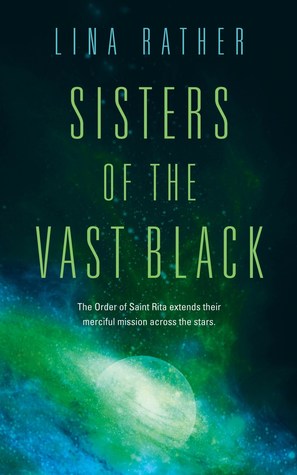 Sisters of the Vast Black (Our Lady of Endless Worlds #1) by Lina Rather
Sisters of the Vast Black (Our Lady of Endless Worlds #1) by Lina Rather  For one thing, the situation isn’t nearly that simple. At first, it seems like a cross between Farscape, the first episode of Star Trek Next Generation, “Encounter at Farpoint”, and the recent We Shall Sing a Song into the Deep. At least right up until the hints of A Memory Called Empire sneak in to bite pretty much everyone in the ass.
For one thing, the situation isn’t nearly that simple. At first, it seems like a cross between Farscape, the first episode of Star Trek Next Generation, “Encounter at Farpoint”, and the recent We Shall Sing a Song into the Deep. At least right up until the hints of A Memory Called Empire sneak in to bite pretty much everyone in the ass.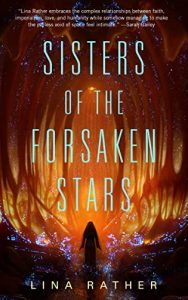 As a gentle story about religious devotion and service to far-flung colonies out in the black, this would have been a lovely thing without going any deeper. But the ambitions of both the governmental central authority and the religious hierarchy push the story to another level, as the nuns have to decide whether to stand up or knuckle under – with hellish consequences either way.
As a gentle story about religious devotion and service to far-flung colonies out in the black, this would have been a lovely thing without going any deeper. But the ambitions of both the governmental central authority and the religious hierarchy push the story to another level, as the nuns have to decide whether to stand up or knuckle under – with hellish consequences either way.
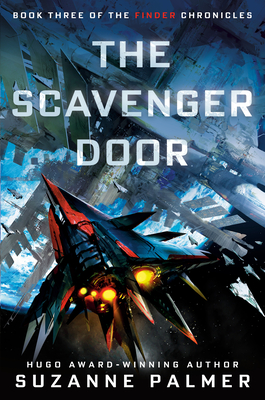 The Scavenger Door by
The Scavenger Door by 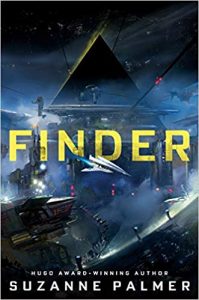 Surprisingly – honestly, extremely surprisingly – the basic premise of The Scavenger Door and the opening of last Friday’s book,
Surprisingly – honestly, extremely surprisingly – the basic premise of The Scavenger Door and the opening of last Friday’s book, 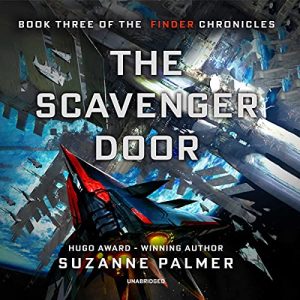 So don’t start here, because this book feels like the payoff for the whole thing. Start with Finder. Also, the audio for this entire series is wonderful. The narrator does a terrific job of conveying Fergus’ universe-weary voice, the entire story is told from Fergus’ first-person perspective. (That the narrator, when he is voicing Fergus’ internal dialog, sounds weirdly like Bill Kurtis from NPR’s
So don’t start here, because this book feels like the payoff for the whole thing. Start with Finder. Also, the audio for this entire series is wonderful. The narrator does a terrific job of conveying Fergus’ universe-weary voice, the entire story is told from Fergus’ first-person perspective. (That the narrator, when he is voicing Fergus’ internal dialog, sounds weirdly like Bill Kurtis from NPR’s 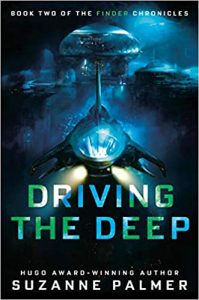 So this is an out-of-the-frying-pan into the lava-filled volcano story that rides on the semi-controlled insanity of its protagonist and the circle of amazing people that have been drawn into his chaotic orbit.
So this is an out-of-the-frying-pan into the lava-filled volcano story that rides on the semi-controlled insanity of its protagonist and the circle of amazing people that have been drawn into his chaotic orbit.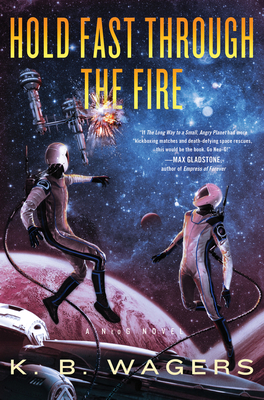 Hold Fast Through the Fire (NeoG #2) by
Hold Fast Through the Fire (NeoG #2) by 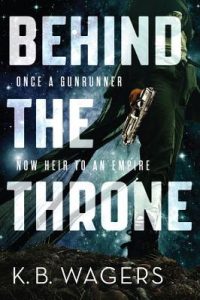 I positively ADORED the first book in the
I positively ADORED the first book in the 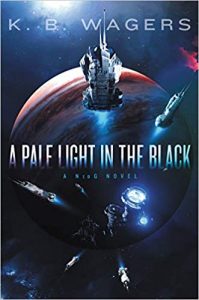 Escape Rating A: This was one of this epic, can’t put it down reads. I started in the morning and finished late in the evening because I just couldn’t stop. Then I went to bed with an horrendous book hangover that I still haven’t shaken.
Escape Rating A: This was one of this epic, can’t put it down reads. I started in the morning and finished late in the evening because I just couldn’t stop. Then I went to bed with an horrendous book hangover that I still haven’t shaken.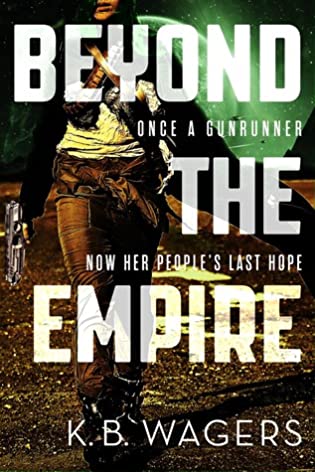 Beyond the Empire (The Indranan War, #3) by
Beyond the Empire (The Indranan War, #3) by 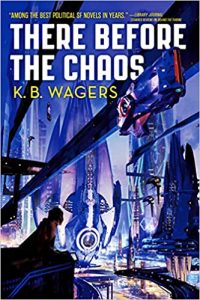 But, as that other old saying goes (a lot of old sayings seem to be turning up in this one), if revenge is a dish best served cold, then this story, in fact this whole trilogy, turns out to be a case study in what happens when someone lets their cold revenge warm up. Wilson has let his revenge heat to a boiling point, along with his temper, his ego and his aggression, and that revenge curdles as much and as badly as you think it will. But the story that results from that curdle is absolutely EPIC.
But, as that other old saying goes (a lot of old sayings seem to be turning up in this one), if revenge is a dish best served cold, then this story, in fact this whole trilogy, turns out to be a case study in what happens when someone lets their cold revenge warm up. Wilson has let his revenge heat to a boiling point, along with his temper, his ego and his aggression, and that revenge curdles as much and as badly as you think it will. But the story that results from that curdle is absolutely EPIC.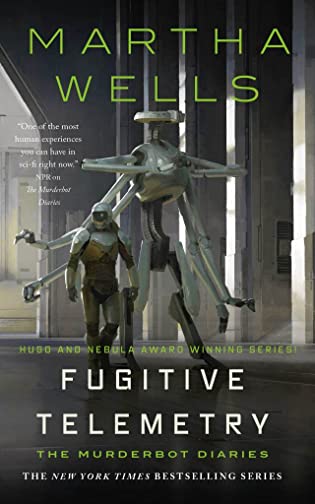 Fugitive Telemetry (The Murderbot Diaries, #6) by
Fugitive Telemetry (The Murderbot Diaries, #6) by 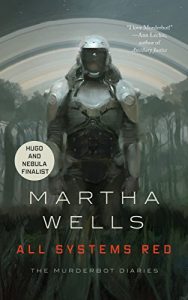 If you like characters who have their snark-o-matic turned up to 11 ALL THE TIME you’re going to love Murderbot. Because it’s snarktastic to the max and we get to spend the entire story inside its head as it thinks about just how much it would like to shove all the humans around it out the nearest airlock – or at least tie and gag them all so they stop getting in its way.
If you like characters who have their snark-o-matic turned up to 11 ALL THE TIME you’re going to love Murderbot. Because it’s snarktastic to the max and we get to spend the entire story inside its head as it thinks about just how much it would like to shove all the humans around it out the nearest airlock – or at least tie and gag them all so they stop getting in its way.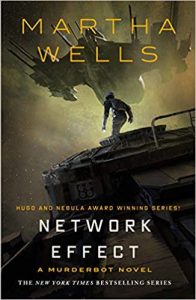 Escape Rating A: If you love Murderbot as much as I do, Fugitive Telemetry is a terrific opportunity to get back in touch with its snark. If you have not yet met Murderbot, this is not the place to begin your acquaintance. Start with
Escape Rating A: If you love Murderbot as much as I do, Fugitive Telemetry is a terrific opportunity to get back in touch with its snark. If you have not yet met Murderbot, this is not the place to begin your acquaintance. Start with  A Desolation Called Peace (Teixcalaan, #2) by
A Desolation Called Peace (Teixcalaan, #2) by  We begin not terribly long after Mahit Dzmare returned to her home, tiny, independent(ish) Lsel Station, after the tumultuous events of
We begin not terribly long after Mahit Dzmare returned to her home, tiny, independent(ish) Lsel Station, after the tumultuous events of  One last thought before this review rivals the book for length. I began
One last thought before this review rivals the book for length. I began 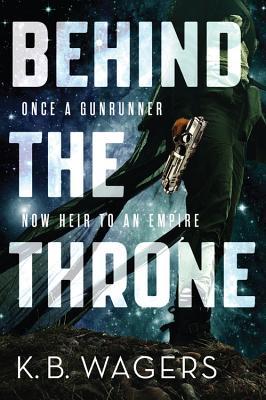 Behind the Throne (The Indranan War #1) by
Behind the Throne (The Indranan War #1) by  Even though they are both extremely unconventional for the positions they hold, their very unconventionality makes them not just the only people by inheritance for those positions at the time they are forced to take them, but the only people by talent, skill and capacity to pull the nuts of their respective empires out of the fires that they have inherited along with their thrones.
Even though they are both extremely unconventional for the positions they hold, their very unconventionality makes them not just the only people by inheritance for those positions at the time they are forced to take them, but the only people by talent, skill and capacity to pull the nuts of their respective empires out of the fires that they have inherited along with their thrones. Soul of Eon (Eon Warriors #8) by
Soul of Eon (Eon Warriors #8) by  Soul of Eon begins in the immediate aftermath of the previous book in this series, the awesome
Soul of Eon begins in the immediate aftermath of the previous book in this series, the awesome  Escape Rating B: I have enjoyed every entry in this and pretty much every single one of this author’s series, and Soul of Eon is no exception to that rule. And it can certainly be said that I had a much better time reading Kaira’s and Thane’s adventure than they had escaping from the Kantos during those same adventures!
Escape Rating B: I have enjoyed every entry in this and pretty much every single one of this author’s series, and Soul of Eon is no exception to that rule. And it can certainly be said that I had a much better time reading Kaira’s and Thane’s adventure than they had escaping from the Kantos during those same adventures!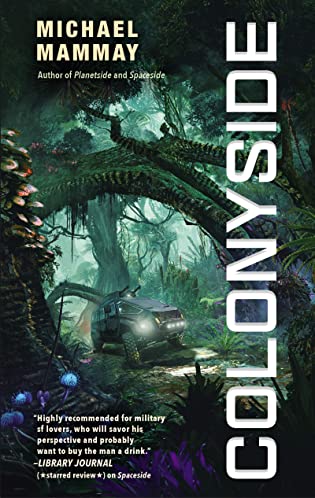 Colonyside (Planetside, #3) by
Colonyside (Planetside, #3) by 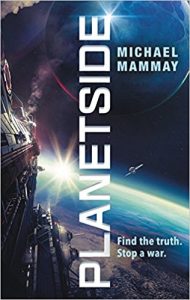 It’s starting to look like Carl Butler’s purpose in the universe is to be an intergalactic scapegoat. Back at the beginning of the series,
It’s starting to look like Carl Butler’s purpose in the universe is to be an intergalactic scapegoat. Back at the beginning of the series, 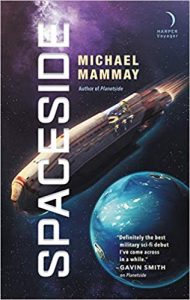 So the mission is kind of Butler’s excuse to get his old “band” back together, but once they’re together they’ve got one hell of a job ahead of them.
So the mission is kind of Butler’s excuse to get his old “band” back together, but once they’re together they’ve got one hell of a job ahead of them. Dune: The Duke of Caladan by
Dune: The Duke of Caladan by 